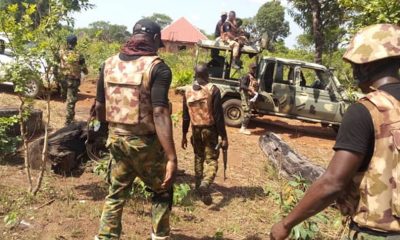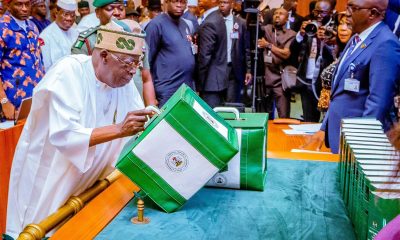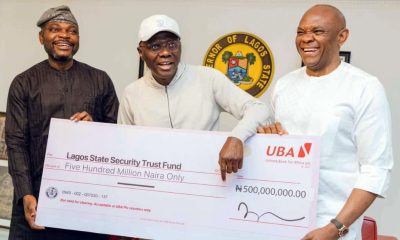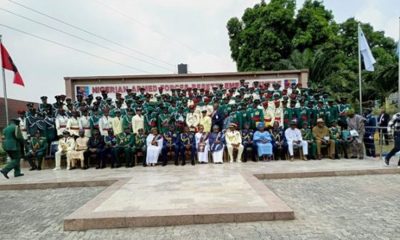metro
Osinbajo To Military: Account For Security Expenditure

Vice President Yemi Osinbajo has underscored the need for transparency in the management of resources meant for the acquisition of hardware for the defence and security agencies.
He spoke late Wednesday during a virtual interaction after receiving a presentation on “Defence Transformation and National Security: Strategic Options for Nigeria of the Future”, by the National Defence College Course 30 participants.
Daily Trust reports that Nigeria is facing a myriad of Foundation opens entry for Oxford scholarships challenges like terrorism, banditry, kidnapping for ransom and agitations for secession, among others.
Security breaches are ripe across all the six geopolitical zones including the Federal Capital Territory (FCT) as symbol of authority is being desecrated and civilians and security operatives killed.
While the federal government had been budgeting billions of naira on defence and security, experts believed the manner in which the resources are being spent is questionable; hence the call for transparency and in some cases probe.
In his presentation to the participants of the Defence College, the vice president said, “There needs to be more accountability because every time you hear about ‘we not having enough equipment,’ but there must be accountability.
“I will like to see a framework for greater accountability within the Ministry of Defence that ensures that they are able to account for military expenditure,” he said in a statement issued Thursday by his spokesman, Laolu Akande.
He said Nigeria’s current security challenges and emerging threats required the military and other relevant stakeholders to be several steps ahead of perpetrators while also stepping up local production of armaments.
READ ALSO:
- Soldiers beat police inspector to death in Lagos over traffic issue
- Arsenal, Crystal Palace clash tonight in 2022/23 EPL opener
- Adamu: APC’s All Muslim Ticket Positive Development
According to him, “If you look at the challenges that we are facing and the nature of those challenges, it is evident that we need to be many steps ahead of non-state actors in particular who are perpetrators of this asymmetric warfare that we are experiencing.”
Prof. Osinbajo, while commending the course participants for their efforts in proposing innovations in the defence sector, stressed the urgency of the local production of arms.
“If we say the local companies should produce some of the mobile platforms like Armoured Personnel Carriers (APCs) and Multi-Role Armoured Vehicle (MRAV), if we give them the contracts, they will produce, but if we choose to import rather than produce locally then we will never develop our military-industrial complex.”
Earlier in a presentation on behalf of the Course 30 participants, Col. A. A. Adamu proposed, among other things, the restructuring of the Ministry of Defence to reflect contemporary challenges as well as contain emerging threats to defence and security.
Other officials present at the event included the Chief of Staff to the President, Prof. Ibrahim Gambari; Chief of Naval Staff, Vice Admiral Awwal Gambo; the Commandant of the National Defence College, Rear Adm. Murtala Bashir, and representative of the Inspector General of Police, among other senior officers from the college.
Research report presentation by course participants to the vice president is a prominent feature in the annual academic calendar of the National Defence College.
Every year since 2016, participants of the college have presented reports of research conducted in key areas to the vice president.
Daily Trust reports that the specifics on the budget and other allocations to the defence sector are rarely made public amid outcry by troops for more equipment to confront the enemy.
There have been controversies about some releases to the security establishments.
For instance, on December 14, 2017, Nigerian governors approved the release of $1bn from the country’s excess oil account to the federal government to buy arms for the effective execution of the Boko Haram war.
The approval reportedly reduced the $2.3bn Excess Crude Account by half, a development that generated heated debate with some analysts saying the money would be stolen.
At the time of the release, Edo State Governor, Godwin Obaseki, who briefed the press on the decision after the meeting of the National Economic Council (NEC), said the money would cover the whole array of needs, which included the purchase of equipment, training for military personnel and logistics.
However, in 2019, the National Security Adviser (NSA), Maj. Gen. Babagana Monguno (retd), said a huge amount of money approved for arms purchase under the ex-service chiefs could not be accounted for.
For instance, Gen Monguno cried out that he did not know the whereabouts of the $1bn approved by the governors.
The NSA office later issued a statement saying Monguno did not say money was missing.
The Presidency also reacted saying the funds allocated for procurement of weapons during the time of the former service chiefs were not missing, adding that procurements had been made but the arms were yet to be delivered.
The service chiefs were Gen Abayomi Olonisakin (Chief of Defence Staff-CDS); Tukur Buratai (Chief of Army Staff-COAS)); Ibok-Ete Ekwe Ibas (Chief of Naval Staff-CNS); Sadique Abubakar (Chief of Air Staff-CAS).
READ ALSO:
- Nigeria Secures $1.5bn Loan From US to Boost Solar Power Infrastructure
- Multi-billion naira NADDC land, imported equipment rot away, says ex-agency boss
- Why Abuja-Kaduna train victims still in captivity, by ex-negotiator
The Senior Special Assistant to the President on Media and Publicity, Garba Shehu, said there was no way funds could disappear under the leadership of President Muhammadu Buhari.
He also said the NSA was misquoted, stressing that Monguno did not accuse the ex-service chiefs of misappropriation of funds.
Shehu said, “About the $1bn taken from the Excess Crude Account with the consent of state governors used for military procurements, I want to assure you that nothing of that money is missing.
“The reference by it in the interview of the BBC Hausa Service by the National Security Adviser has been misconstrued and mistranslated. NSA made two critical points -one is that we don’t have enough weapons, which is a statement of facts, and two procurements made have not been fully delivered.
“At no point did the NSA say that money has been misappropriated and that no arms seen. They have not been delivered, that is correct; these are things you don’t get off the shelves,” Shehu said.
Non-transparent military spending can create war economy – Expert
Speaking on the implication of the vice president’s demand, a financial crimes expert, Umar Yakubu, explained that non-transparency in military spending could cause a war economy.
“There is a need for more transparency in military spending because if we don’t, we are going to create a war economy where we will not be able to continue sustaining the corruption and where the war will not finish. That is one of the reasons insecurity has not gone down,” Yakubu said.
He stressed that Nigerians would have more confidence in the military and the work they do if they halt the current secrecy regarding their spending.
“If you look all over the world, one area where there seems to be lack of transparency and opaqueness is the military sector in relation to their expenditure.
“Most governments hide under the cover of insecurity to tell you that they are not going to disclose how much they are spending on insecurity.
He said for the vice president to call for more transparency, speaks volumes.
“If you look at the trajectory from 2017 to 2021, the military budget has been increasing by a minimum of N500 million every year. If I am correct, it is over N2trn now – just to the military.
“If you crosscheck with what the minister of finance said, their releases are high, it is not just only about their budget. The releases are high, maybe up to 90%.
“Now, if there is so much heavy military expenditure and when you ask them, they will tell you that they lack equipment, so what is the problem? Where does the problem lie?” he asked.
Efforts to reach the Director, Defence Information, Maj.-Gen. Jimmy Akpor proved abortive as calls to his mobile phone did not connect before filing this report.
metro
Lagos govt insists nightclubs, worship centres must obtain permit for amplified sound
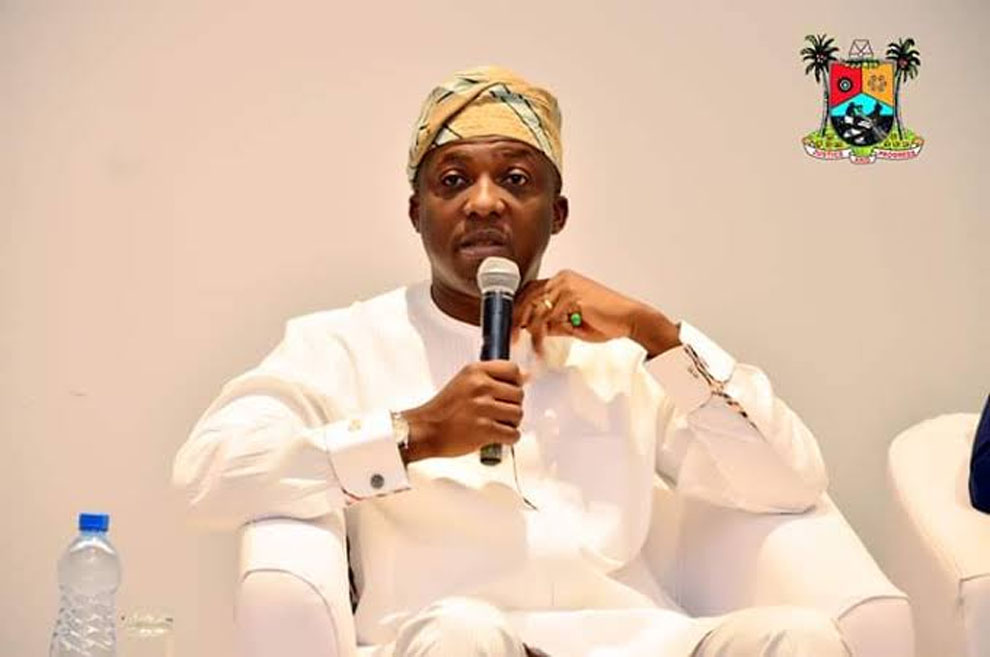
Lagos govt insists nightclubs, worship centres must obtain permit for amplified sound
The Lagos State Government has rolled out stricter measures to combat noise pollution, requiring nightclubs, lounges, bars, and worship centres to obtain permits for events involving amplified sound.
The measure, it said, aimed to safeguard the health and well-being of Lagosians during the festive season and beyond.
Lagos State Commissioner for Environment and Water Resources, Tokunbo Wahab, announced this via his official X (formerly Twitter) account on Saturday, emphasizing the government’s zero-tolerance stance on noise pollution.
Wahab highlighted that events with amplified sound must be conducted in soundproofed, enclosed spaces to protect residents from the harmful effects of excessive noise.
READ ALSO:
- Alleged missing N180m: It’s a prank, Singer Dammy Krane says
- Inter Milan crush Cagliari 3-0 to top Serie A
- Kemi Badenoch political career may be in danger – Top diplomat
“Establishments such as worship centers, nightclubs, lounges, and bars must now obtain permits for events involving amplified sound and ensure these activities take place in soundproofed, enclosed spaces to protect neighboring residents,” the statement read in part.
To enforce these directives, the government said it had established a Special Task Force on Noise Pollution under the Lagos State Environmental Protection Agency (LASEPA).
This task force, in collaboration with the Lagos State Neighborhood Safety Corps (LSNSC) and the Lagos State Environmental Sanitation Corps (LAGESC), would oversee compliance, arrest offenders, and prosecute violators of noise regulations, it stated.
The statement further noted that starting January 2025, the government would roll out a public awareness campaign to educate Lagosians on acceptable noise levels and the benefits of a quieter environment.
Lagos govt insists nightclubs, worship centres must obtain permit for amplified sound
metro
Alleged missing N180m: It’s a prank, Singer Dammy Krane says
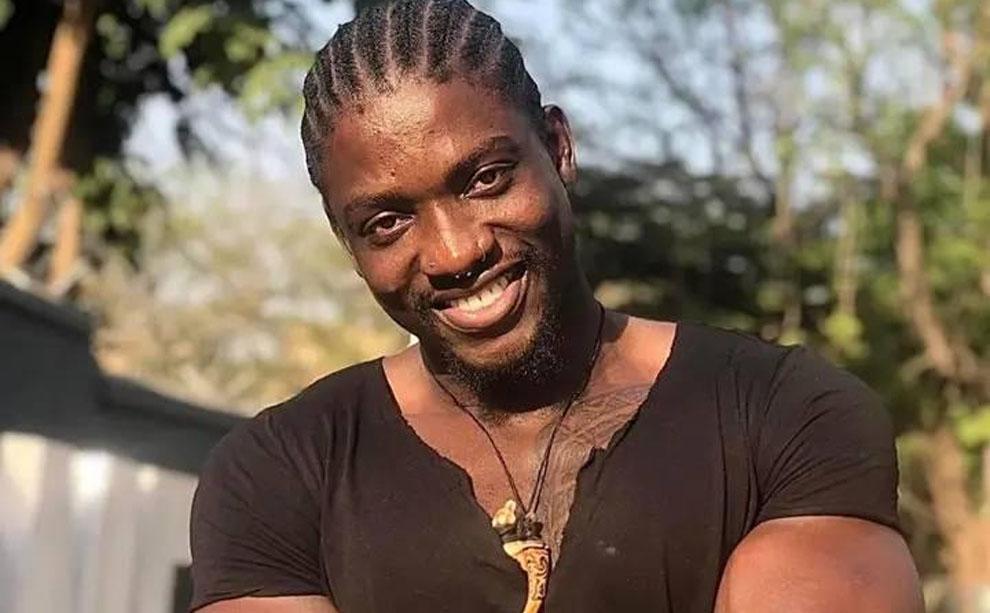
Alleged missing N180m: It’s a prank, Singer Dammy Krane says
Singer, Dammy Krane has stated that social critic, Very Dark Man, is joking with claims that N180 million was diverted from the NGO account he created in October this year.
VDM shocked Nigerians on Friday, December 27 when he released a video claiming hackers had breached his NGO website and moved N180m leaving only N20 million.
The news shocked many Nigerians who took to social media to slam him.
READ ALSO:
- Inter Milan crush Cagliari 3-0 to top Serie A
- Kemi Badenoch political career may be in danger – Top diplomat
- Oluwo backs push for Sharia law in South-West
However, in a post shared on his Instagram page this evening, Dammy Krane claimed that VDM is renovating a school in Jos, and was only joking with the story of stolen funds.
Also, a Human Rights activist, Omotayo Williams, claimed the man VDM showed in his video as an officer accompanying him to Jos is a well-known member of the Kogi State Taxi Taskforce.

Alleged missing N180m: It’s a prank, Singer Dammy Krane says
metro
Oluwo backs push for Sharia law in South-West

Oluwo backs push for Sharia law in South-West
The Oluwo of Iwo, Oba Abdulrasheed Akanbi, has expressed support for the proposed implementation of Sharia law in the South-West, emphasizing its historical presence in Yoruba culture.
Oba Akanbi noted that Sharia principles have long been part of Yoruba land, citing examples such as Sharia banking and the existence of a Sharia college in Iwo, Osun State.
He stated, “Sharia law has been in Iwo for over 100 years… It’s the right of Muslims to choose customary law or the high court.”
Recall that the discussion around Sharia law gained traction after plans were announced for the inauguration of a Sharia council on January 11, 2025, at the Muslim Community Islamic Centre in Oyo. However, the event has been postponed indefinitely following widespread public criticism.
READ ALSO:
- Niger: DSS officers kill three notorious bandits, recover arms, motorbikes
- Shettima admits killing of civilians in Sokoto airstrikes, tenders apology
- Tinubu not telling Nigerians the truth, says Sule Lamido
Critics have argued that the Yoruba-dominated South-West, where Muslims and Christians coexist, is distinct from the predominantly Muslim northern region where Sharia is more widely practiced.
Addressing concerns, Oba Akanbi explained that Sharia law is already embedded in Nigeria’s constitution and should not cause alarm for non-Muslims.
“Sharia law is only for Muslims and does not concern others. If any other person likes it, they can convert to Islam, and Muslims can also convert to Christianity. Everyone is free,” he said.
The monarch also drew attention to the challenges faced by Muslims under existing laws, particularly in matters such as inheritance and divorce, where Western legal frameworks may not align with Islamic traditions. “Many Muslims feel disenfranchised… Western education doesn’t understand the ways of Muslim divorce, marriage, and inheritance,” he added.
Oba Akanbi emphasized that Sharia law represents the inalienable rights of Muslims and should not be viewed as a threat to other religions. “No government can deny Muslims their inalienable rights,” he concluded.
Oluwo backs push for Sharia law in South-West
(PUNCH)
-

 Auto2 days ago
Auto2 days agoLSM MD extols founder’s qualities after latter posthumous industry award
-

 Entertainment2 days ago
Entertainment2 days agoMultiChoice announces free access to all DSTV channels for 3 days
-

 metro3 days ago
metro3 days agoJigawa State governor loses son 24 hours after mother’s death
-

 News2 days ago
News2 days agoNigeria Customs Service begins 2025 recruitment [How to apply]
-

 metro2 days ago
metro2 days agoHeavy security in Ilesa as ex-Osun deputy gov emerges new Owa-Obokun
-

 metro2 days ago
metro2 days agoLagos Imam to Tinubu: You haven’t disappointed us
-

 metro2 days ago
metro2 days agoDangote, Tinubu, Lookman named among 100 most influential Africans in 2024 (Full list)
-

 Africa1 day ago
Africa1 day agoNiger’s president faces fire at home over attack on Nigeria

